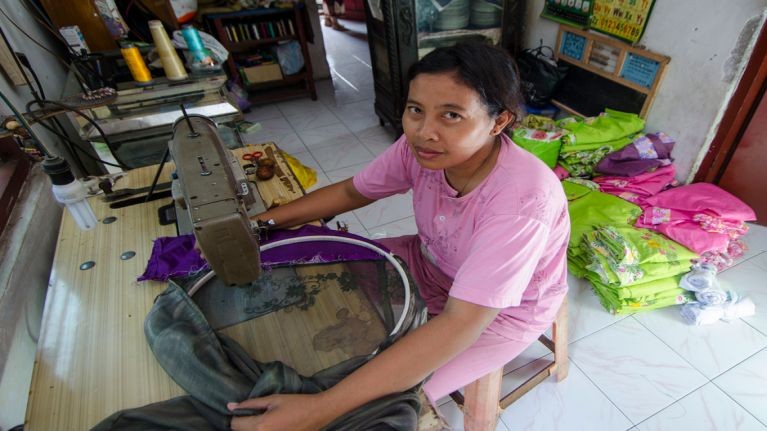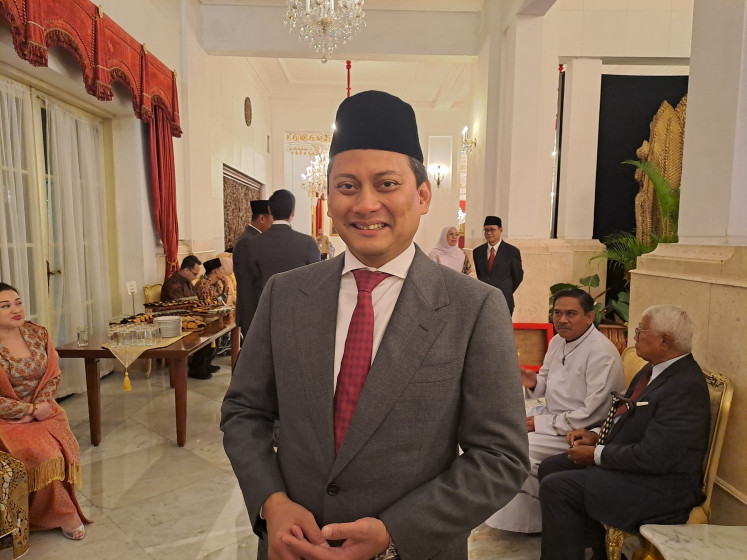Popular Reads
Top Results
Can't find what you're looking for?
View all search resultsPopular Reads
Top Results
Can't find what you're looking for?
View all search resultsThe ‘other’ workers’ tale: Women home-based workers in Indonesia
Home-based workers are predominantly workers without formal contracts, meaning they endure unstable income, low wages, no insurance and inadequate working conditions.
Change text size
Gift Premium Articles
to Anyone
T
he pandemic has given many the luxury of working from home. But not everyone has the option of doing this with a sustainable income, decent working space and secured social protection month by month. There are “other” workers who actually worked from home long before the pandemic but with different working circumstances.
So, who are they?
They are home-based workers (HBWs), defined by the International Labour Organization (ILO) as “workers who are self-employed or in the putting-out system”. In Indonesia, the Micro, Small and Medium Enterprises (MSMEs) Law categorizes HBWs as informal workers, while the home industry guideline from the Women's Empowerment and Child Protection Ministry classifies them as cottage industry workers.
But, whether self-employed, in the putting-out system or employed in a cottage industry, HBWs are extremely vulnerable. For one, they are not defined in the Labor Law, and Indonesia has not yet ratified the 1996 ILO Convention No. 177 on home work. Basically, HBWs are predominantly workers without formal contracts, meaning they endure an unstable income, low wages, no insurance and inadequate working conditions.
Indonesian HBW Zaenab acts as a facilitator who supports the Women's Empowerment and Child Protection Ministry’s program for women HBWs in Rembang regency, Central Java. She began her role in 2016 and is among those who continue the facilitation role today.
Zaenab does not give up her service “because the work is not finished, there is still much to be done.”
As a facilitator, Zaenab understands personally the challenges and needs of her fellow women HBWs in navigating livelihood strategies. This is important because her profile as a woman and a HBW enhances her connection to the program members.
But Zaenab’s facilitation journey is not always smooth. She has faced scrutiny from husbands of women HBWs and folks who oppose the program. Such resistance has prevented some women HBWs from participating in the program.
There are, however, cases in which the program helped survivors to escape a domestic violence situation. From Zaenab’s monitoring, women HBWs not only experience economic struggle but also domestic violence. Additionally, some of these women HBWs are breadwinners, who had to juggle between making ends meet, child care and house chores even before the pandemic struck.
Based on Zaenab’s observation, women HBWs mostly have low self-esteem, are not acknowledged as workers, and, in some cases, are not covered by social protection. The digital economy poses another challenge to them as most of them are not digitally literate.
Making sense of her facilitation learnings, the workability of women HBWs depends on the fulfillment of these four key needs: 1) assistance in strengthening leadership and confidence to enhance eligibility and mobility; 2) support in capacity building on product development and marketing; 3) a safe space that includes men in the conversation, and 4) commitment in policy and budgeting to the recognition and protection of HBWs as workers.
For Zaenab and other facilitators, if those needs are fulfilled, the pathway to increase mobility level, quality of employment and economic empowerment of HBWs will be achievable.
The Women's Empowerment and Child Protection Ministry has implemented the women HBWs economic empowerment program since 2016. The pilot program has been in place in 21 regencies/cities and is to be replicated in other regions.
The story of Zaenab has become a reference for other subnational governments to ignite commitment to strengthening women HBWs in their jurisdictions.
The ministry is also committed to improving the conditions of women HBWs. With regard to the aforementioned needs of HBWs, the ministry is taking the following actions.
First, strengthening women’s leadership and economic empowerment through themes such as gender-equality based entrepreneurship, eliminating violence against women and reproductive health are part of the endeavor to enhance safe spaces for women HBWs.
Second, engaging subnational governments, companies and the private sector to promote the products of local homeworkers.
Third, supporting subnational governments to strengthen local commitments through local development planning and budget.
But the ministry realizes that it also needs collaborative support from like-minded friends, allies and comrades. This includes the ministry’s partnership with development partner Microsave (MSC).
MSC currently supports the ministry on women’s economic empowerment and financial inclusion programs. Through its experiences in gender equality programs, MSC acknowledges the interplay of four key interdependent factors that are commonly overlooked in designs of programs for women. This is also observed by MSC in the context of women HBWs in Indonesia.
For MSC, the four key interdependent factors that are central in endeavoring women’s economic empowerment programs for HBWs, must include the following understanding: awareness and capability; access and control over productive resources; adverse social norms; practices and participation; and financial/economic/external environment.
The other important ally is the civil society organization coalition that has been advocating national and subnational legislation on the protection of HBWs in Indonesia. Although the ministerial regulation on the protection of homebased workers is not yet legislated, the coalitions’ campaigns at subnational grounds have influenced local regulations and policies to develop programs on equal and inclusive working system for HBWs.
The experiences of women HBWs are not only tales, the above are evidence-based observations to advocate positive change to their otherization experiences as workers.
Recognizing the profiles and gaps of women HBWs can be enhanced by improving national and subnational gender equality and social inclusion disaggregated data on HBWs. The void on policies and development planning on HBWs can be filled with informed and comprehensive decision-making processes based on the reality and needs of HBWs.
Next is including those who are excluded in the conversations and decision-making processes. Making room for representatives of women HBWs, facilitators, corporations and service providers in the campaign and awareness dialogue and program designs on HBW is crucial to ensure balance and equity in a bid to achieve decent work and economic empowerment of women HBWs.
Happy International Women’s Day!
***
Dyana Savina Hutadjulu is a gender equality and social inclusion specialist at Microsave Consulting. Eni Widiyanti is an economic assistant to the deputy women's empowerment and child protection minister for gender mainstreaming.










